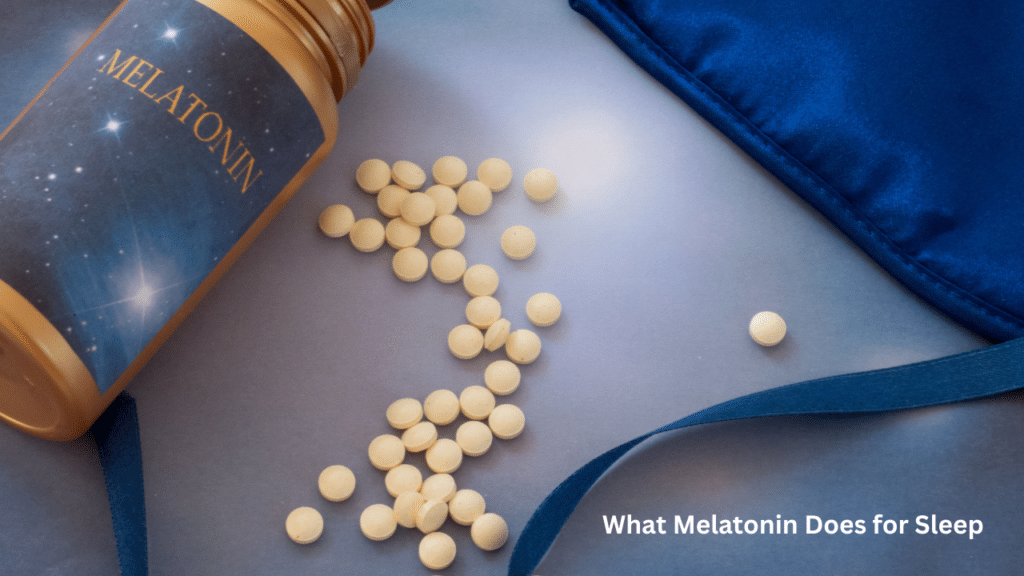Introduction
Sleep is a crucial component of your overall well-being, yet so many people have a hard time achieving a restful night’s sleep. Not catching enough Z’s can cause problems like fuzzy thinking, a weaker immune system, and higher stress. Sorting out why you’re not sleeping well can change everything—from how energetic you feel during the day to maintaining better health long-term. Quality rest is crucial for living fully!
One natural way to improve sleep is by increasing your melatonin levels. Often dubbed the “sleep hormone,” melatonin significantly influences how well you manage falling asleep and waking up at appropriate times. Produced by the tiny but mighty pineal gland, this chemical messenger lets your body know it’s evening and starts preparing you for bed.
While melatonin supplements are available, there are also many foods that naturally boost melatonin production in the body. Including certain foods in your diet could make falling asleep easier and improve how well you sleep through the night. Today we’ll check out foods rich in melatonin. Next up is exploring the role of Vitamin D in sleep patterns before finishing off with why it’s smart to monitor your Vitamin D levels via blood work. Once you’re aware of how important these nutrients are, it’s easier to adopt habits for sleeping better and staying healthy.

What Melatonin Does for Sleep
Melatonin is a vital hormone in regulating the sleep-wake cycle, known as the circadian rhythm. Produced by the pineal gland in the brain, melatonin levels naturally rise in the evening as darkness falls, signaling to your body that it’s time to prepare for sleep. By promoting both falling asleep and staying there until morning, this hormone is key to enjoying a full night’s restful slumber.
Light exposure influences the body’s production of melatonin. During the day, light suppresses melatonin production, keeping you awake and alert. Conversely, as night approaches and light exposure decreases, melatonin levels increase, promoting relaxation and drowsiness. Too much screen time before bed, inconsistent sleep habits, and exposure to artificial light can mess with our natural sleep patterns.
While most know melatonin for its role in promoting restful nights, it’s equally important for its antioxidant benefits and for supporting our immunity. Protecting your cells from harm is one benefit; reducing swelling might be another. Understanding what melatonin does for you means making smarter moves for a good night’s sleep and staying healthy all around.
Eating snacks or meals with lots of melatonin could be the key to naturally boosting this hormone and sleeping soundly through the night. In the coming weeks, we’ll discuss various kinds of food and the advantages each one offers.

Foods High in Melatonin
Incorporating melatonin-rich foods into your diet is an effective way to enhance your sleep quality. Five foods can naturally increase your melatonin levels, helping you get a better night’s sleep.
Tart Cherries
For those who want to enhance their nightly rest without supplements, incorporating tart cherries into your diet can provide that extra dose of melatonin you need. Tart cherry juice isn’t just delicious; it’s also shown promise in raising melatonin levels which could help you get deeper, more restorative rest at night. Packed with melatonin, tart cherries aid in better sleep while their rich antioxidant content fights off inflammation, supporting your health all around. A glass of tart cherry juice in the evening or a handful of cherries as a before bedtime snack can significantly affect your sleep patterns.
Bananas
Struggling to fall asleep at night? Bananas are an excellent choice—they’re full of substances that naturally ease tension and improve your chances of snoozing soundly. The combo of melatonin with muscle-relaxing magnesium and nerve-soothing potassium preps you perfectly for a good night’s rest. Besides being delicious, bananas offer vitamin B6 that assists in changing tryptophan into serotonin—a key step before it turns into the sleep hormone melatonin. Eating a banana at night could be just what you need to unwind, making it simpler to fall asleep peacefully.
Oats
You’d be surprised at how versatile oats are – beyond their nutritional value, they could actually help you get a good night’s rest. Oats naturally provide melatonin, plus they pack complex carbs that boost tryptophan’s effectiveness in the brain. Your brain needs to create serotonin and melatonin effectively—two chemicals vital for feeling good and sleeping soundly—and it relies on this particular amino acid. Picture yourself curled up on the couch with a hot bowl of oatmeal after a long day. It’s loaded with nutrients vital for making melatonin, which aids sleep while providing warmth and calmness as bedtime approaches.
Nuts
Eating nuts, particularly walnuts and almonds, are rich in melatonin. Eating almonds could improve your sleep quality since they contain magnesium, ease inflammation, and decrease cortisol levels—the stuff responsible for making us feel stressed out. Walnuts aren’t just tasty—they’re also great for keeping your mind sharp and regulating how well you snooze because they contain essential omega-3 fatty acids. A small handful of nuts as a bedtime snack can provide the necessary nutrients to boost melatonin production and enhance sleep.
Rice
Rice, especially jasmine rice, has been shown to improve sleep quality due to its high glycemic index. Consuming jasmine rice a few hours before bedtime can increase the availability of tryptophan, promoting the production of serotonin and melatonin. If you often include rice in your meals, studies suggest you’ll likely experience improved sleep quality and longer snooze times. Incorporating rice into your dinner can be an easy way to support your body’s natural melatonin production.
The Link Between Vitamin D and Sleep
While melatonin is crucial for sleep, vitamin D also plays a significant role in maintaining healthy sleep patterns. Think of vitamin D as your body’s multitasker—it supports your immune system, keeps your bones strong, and can brighten up your day by balancing mood swings. There’s growing proof showing how missing out on vitamin D can mess with your sleep patterns.
Vitamin D receptors are present in areas of the brain that regulate sleep. If you’re low on vitamin D, you could experience disruptions in how well you snooze. This deficiency often results in sleeplessness or just generally bad nights’ rest. Lacking sufficient vitamin D has been connected to a greater risk for sleep apnea, where one’s breath stops and starts throughout their slumber.
If you maintain healthy levels of vitamin D, you’re likely to experience deeper, more refreshing sleep compared to those running low on the sunshine vitamin. Sunlight exposure is the primary source of vitamin D, but it can also be obtained through certain foods and supplements. Because vitamin D significantly impacts how we rest at night along with our broader health, make it a priority to include plenty in what you eat or via sun exposure every day.
The Importance of Vitamin D Blood Tests
Monitoring your vitamin D levels is crucial for maintaining overall health and ensuring quality sleep. Vitamin D deficiency is widespread and often hits those with little sun exposure or poor dietary sources of the vitamin hardest. A vitamin D blood test is a simple and effective way to determine if you have adequate levels of this essential nutrient.
Watching over your vitamin D intake matters more than you might think! Proper amounts strengthen bones, enhance immune function and keep us feeling upbeat day-to-day—a few quick tests can make all the difference in catching any shortages early.
Think of vitamin D as a multi-tasker – it’s vital for bone strength, fighting off infections, and maintaining good spirits. Skimping on necessary nutrients? That’s risky business for your well-being! Expect weaker bones over time, frequent bouts of illness due to poor immunity, plus potential battles against mood disorders including anxiety or depressive episodes. Importantly, as we’ve discussed, insufficient vitamin D levels can also contribute to sleep disturbances and disorders like insomnia and sleep apnea.
Symptoms of Vitamin D Deficiency
Some common symptoms of vitamin D deficiency include fatigue, bone pain, mood changes, and muscle weakness. Many folks with low vitamin D might not show clear signs, so getting tested regularly helps catch any issues early and start treatment.
Benefits of Vitamin D Blood Tests
A vitamin D blood test measures the level of 25-hydroxyvitamin D in your blood, providing a clear picture of your vitamin D status. Once you’re aware of your levels, it’s easier to tackle any shortages. Whether that means changing what’s on your plate, taking certain supplements or enjoying extra hours under the sun is entirely up to you! Having issues with sleep? A simple test to monitor your vitamin D may hold the key to improving how well you rest each night. You can order a Vitamin D Blood Test at Walk-In Lab.
Conclusion
Achieving a good night’s sleep is vital for your overall health and well-being. If you understand what roles melatonin and vitamin D play in getting good shut-eye, you can take steps leading to deeper, more restful nights without extra aids. For those restless nights when counting sheep just won’t cut it—try adding some food that supports good sleep! Cherries mixed into breakfast cereal or snacking on almonds can increase melatonin levels effectively.
Knowing how a vitamin D shortage affects sleep is essential for better rest. Adequate amounts of vitamin D might prevent sleep issues and lead to deeper, more refreshing slumber. Regularly testing your vitamin D levels helps you stay in tip-top shape.
Better rest might be a plate away—load up on melatonin-friendly eats and get regular checks for sufficient vitamin D levels. Boosting your nightly rest and general health can be as easy as incorporating simple and natural strategies into your routine. Take control of your nightly rest by incorporating our helpful hints starting today! And don’t forget—a simple blood test for Vitamin D might reveal what’s missing in your quest for deep, revitalizing sleep.

